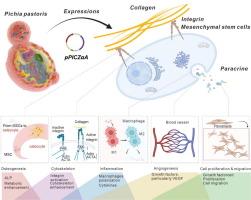重组胶原介导的间充质干细胞功能调节的多组学研究
IF 13
1区 综合性期刊
Q1 MULTIDISCIPLINARY SCIENCES
引用次数: 0
摘要
再生医学利用间充质干细胞(MSCs)和生物材料的潜力来克服传统器官移植的局限性。胶原蛋白是一种重要的细胞外基质成分,被广泛使用,但其与间充质干细胞的分子相互作用仍不充分了解。目的研究重组胶原如何调节间充质干细胞的行为和旁分泌功能,为组织再生生物活性支架的开发提供依据。方法采用毕赤酵母合成重组ⅰ型和ⅲ型胶原蛋白。多组学分析,包括转录组学和蛋白质组学,被用于评估这些胶原对MSC基因表达、分泌谱以及对成纤维细胞、内皮细胞和巨噬细胞的功能影响的影响。结果重组胶原可调节血管生成、创面愈合、黏附、细胞骨架组织和成骨相关的MSC通路。蛋白质组学数据进一步显示细胞因子和生长因子的分泌增强,影响周围基质细胞和免疫细胞的行为。结论重组胶原作为一种生物活性物质,具有重塑间充质干细胞功能的作用。其中,重组I型胶原主要激活FAK/RHOA/ROCK信号通路,重组III型胶原主要激活PI3K/Akt信号通路;相反,牛源型胶原主要调节糖酵解。这些发现进一步支持了重组胶原在构建具有智能调控功能的再生医学支架方面的潜力。本文章由计算机程序翻译,如有差异,请以英文原文为准。

Multi-omics elucidation of recombinant collagen‐mediated modulation of mesenchymal stem cell functions
Introduction
Regenerative medicine leverages the potential of mesenchymal stem cells (MSCs) and biomaterials to overcome the limitations of traditional organ transplantation. Collagen, a key extracellular matrix component, is widely used, yet its molecular interactions with MSCs remain insufficiently understood.Objectives
This study investigates how recombinant collagens modulate MSC behavior and paracrine functions to inform the development of bioactive scaffolds for tissue regeneration.Methods
Recombinant type I and III collagens were biosynthesized using Pichia pastoris. Multi-omics analyses, including transcriptomics and proteomics, were conducted to evaluate the effects of these collagens on MSC gene expression, secretory profiles, and functional impacts on fibroblasts, endothelial cells, and macrophages.Results
Recombinant collagens regulated key MSC pathways related to angiogenesis, wound healing, adhesion, cytoskeletal organization, and osteogenesis. Proteomic data further revealed enhanced secretion of cytokines and growth factors that influenced the behavior of surrounding stromal and immune cells.Conclusion
Recombinant collagen, as a bioactive material, can remodel the functions of mesenchymal stem cells. Specifically, recombinant type I collagen primarily activates the FAK/RHOA/ROCK signaling pathway, while recombinant type III collagen activates the PI3K/Akt signaling pathway; in contrast, bovine-derived type I collagen mainly regulates glycolysis. These findings further support the potential of recombinant collagen in constructing regenerative medicine scaffolds with intelligent regulatory functions.求助全文
通过发布文献求助,成功后即可免费获取论文全文。
去求助
来源期刊

Journal of Advanced Research
Multidisciplinary-Multidisciplinary
CiteScore
21.60
自引率
0.90%
发文量
280
审稿时长
12 weeks
期刊介绍:
Journal of Advanced Research (J. Adv. Res.) is an applied/natural sciences, peer-reviewed journal that focuses on interdisciplinary research. The journal aims to contribute to applied research and knowledge worldwide through the publication of original and high-quality research articles in the fields of Medicine, Pharmaceutical Sciences, Dentistry, Physical Therapy, Veterinary Medicine, and Basic and Biological Sciences.
The following abstracting and indexing services cover the Journal of Advanced Research: PubMed/Medline, Essential Science Indicators, Web of Science, Scopus, PubMed Central, PubMed, Science Citation Index Expanded, Directory of Open Access Journals (DOAJ), and INSPEC.
 求助内容:
求助内容: 应助结果提醒方式:
应助结果提醒方式:


